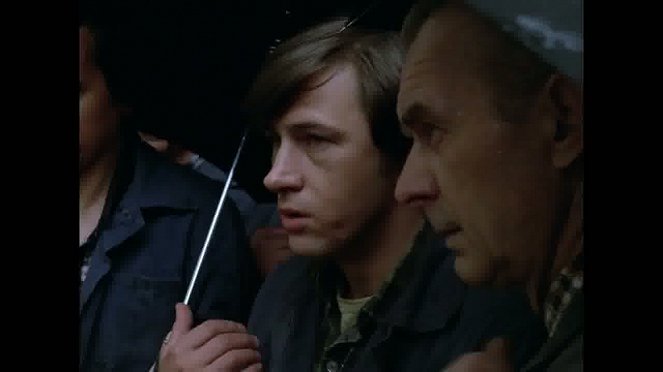Directed by:
Andrzej WajdaScreenplay:
Aleksander Ścibor-RylskiCinematography:
Edward KlosinskiComposer:
Andrzej KorzyńskiCast:
Jerzy Radziwilowicz, Krystyna Janda, Marian Opania, Irena Byrska, Wiesława Kosmalska-Maklakiewicz, Boguslaw Linda, Franciszek Trzeciak, Janusz Gajos (more)Plots(1)
MAN OF IRON, Andrzej Wajda's account of the events at the Gdansk shipyard in the summer of 1980, stars Marian Opania as Winkiel, a burned-out, alcoholic journalist who's assigned to look into the activities of Maciek Tomzyk (Jerzy Radziwilowicz), the charismatic and articulate leader of striking shipyard workers. He turns out to be the son of Mateusz Birkut (the tragic hero--also portrayed by Radziwilowicz). The journalist makes use of his own reputation as a youthful radical, implying a solidarity with Tomzyk even as he searches for the dirty laundry the party bosses hope he'll find. But as he interviews the labor leader's associates and his detained wife, Agnieszka (Krystyna Janda), and hears of his travails and of his father's death in the 1970 crackdown against the workers, Opania begins to feel his former idealism returning, forcing him to consider putting his own career at risk to side with the strikers. Wajda incorporates a wide range of archival material--including posters, documentary footage, still photos, audio recordings, and eyewitness testimony--into a compelling narrative of epic history unfolding in real time. (official distributor synopsis)
(more)Reviews (3)
The film continues in the closest possible way to Andrzej Wajda's previous film, Man of Marble. It was 1981, and Poland had experienced turbulent events surrounding the shipyard strike and the establishment of Solidarity, and the regime was shaking at its foundations. Wajda lost his last illusions about the system, so he depicted reality in the film as he perceived it, without holding back. The film is not as cleverly structured as Man of Marble, the script is weaker from a formal perspective, and some scenes could have been cut. Although I didn't feel bored at all during the extremely long Man of Marble, I yawned a few times during Man of Iron. However, this doesn't change the fact that it is still a very decent film, in many ways emotional, and above all - which was not typical for Wajda before - historically truthful. The strongest character this time is not the strike hero Maciek Tomczyk or his wife, but the reporter Winkel, who is a very complicated "hero." On one hand, he has no illusions about the system, on the other hand, it is an integral part of his life, and he has a lot to lose. He has issues from the past and is blackmailed by the state power. He sympathizes with the strikers, but he doesn't believe in their success and is afraid of the future. His character reminds me of the fates of many who got involved with the state security apparatus in Czechoslovakia and, after the fall of the regime, faced contempt from the media and the public regardless of their real deeds and motivations. Overall impression: 80%.
()
It is a very well-made film, but isn't it strange that no one complains about ideological prejudice regarding the film? Strange. This is because the film is nothing more than a hagiographic tale of good and evil, a kind of inverted building film in which moral democratic life is constructed through dissatisfied workers instead of socialism and contented workers. When something is turned upside down, only the signs are exchanged, but the structure remains the same... What is present in building (communist) ideology and propaganda in films can be found here - in a situation turned 180 degrees - as a reflection of true history, of course. As a true Pole, Wajda clearly systematically tries to build legends about his nation through his films, which may impress Poles, but for people who see through the nonsense about "a life of truth," sanctioned by constant (idolatrous, morally burdensome for some) "in the name of the Father, the Son, and the Holy Spirit," this agitprop (also due to its length) can tend to not be a very pleasant experience.
()
Andrzej Wajda was definitely a person who proved that it is possible to make powerful political films in the Eastern Bloc, which are actually human and interested in how historical events can be perceived from a human perspective. It's long, but it truly and believably depicts the image of Poland at that time.
()

